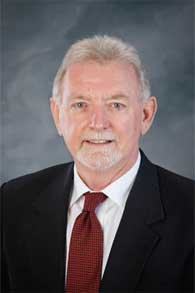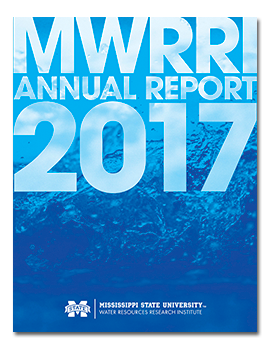FROM THE DIRECTOR

Greetings from the Mississippi Water Resources Research Institute. As most of you know by now, the Institute had a change in leadership in 2011. My name is Wayne Wilkerson, and I am the Institute's new Director. I am also an Associate Professor in the Department of Landscape Architecture here at MSU.
Since taking on the role of Director back in the spring of 2011, I have traveled all over the state of Mississippi meeting with as many citizens and public officials as possible to get their impressions of how the Institute could best be addressing current and future water related issues.
I am sure everyone is aware of the impact that the Flood of 2011 had on the Mississippi Delta. The Flood set new record stages at Vicksburg and Natchez and approached record levels at Greenville and Memphis. Farm Bureau estimated that over 600,000 acres of Mississippi farmland were impacted. At the same time Texas and Oklahoma, as well as parts of Louisiana, are experiencing severe droughts. What is the common denominator for these issues? Water. I see the role of the Institute as a clearinghouse of resources to assist the citizens of Mississippi respond to these types problems in a positive manner.
If you look at page four of this newsletter you will see the Institute's four goals clearly defined. I plan to make an effort to have at least one success story for each of those goals each year. Following issues will highlight these successes.
This is the Spring publication for 2012. We hope to have four issues per year—Spring, Summer, Fall, Winter. Each issue will have a different theme. This publication introduces you to our four new Advisory Board members, as well as a brief description of our Annual Conference. Page 5 is a profile of one of success stories. Enjoy.
FUNDED RESEARCH PROJECTS
WRRI 2012 U.S.G.S. Annual Competitive Grants Awards

Title: Acoustic Measurements for Monitoring Fine Suspended Sediment in Streams.
Principal Investigators: James P. Chambers, Interim Executive Director, National Center for Physical Acoustics. University of Mississippi. Cristiane Q. Surbeck, Assistant Professor, Department of Civil Engineering, University of Mississippi. Wayne Carpenter, R & D Engineer, National Center for Physical Acoustics. University of Mississippi.
Title: Soil Media Compositions for Water Quality Improvements And Stormwater Management in Urban Flow-Through Facilities.
Principal Investigators: Robert Kröger, Assistant Professor, Dept. of Wildlife, Fisheries & Aquaculture, Mississippi State University. Warren C. Gallo, Assistant Professor, Dept. of Landscape Architecture, Mississippi State University.
Title: Analysis of Precipitation Variability and Related Groundwater Patterns over the Lower Mississippi River Alluvial Valley.
Principal Investigators: Jamie Dyer, Associate Professor, Department of Geosciences, Mississippi State University. Andrew Mercer, Assistant Professor, Department of Geosciences, Mississippi State University.
ADVISORY BOARD
New Advisory Board Members
Karrie Pennington, PhD
Karrie has been working with the US Department of Agriculture's Natural Resources Conservation Service since 1992, studying the impacts of land use on water ecosystems. She completed a B.A in biology at the University of North Texas, and completed a M.S. in soils from the University of Idaho in Moscow. She taught as a visiting professor at the same university until moving to Tucson, Arizona, where she taught for three more years. She received her Ph.D. in soil and water science, and moved east to the Mississippi Delta, completing her post-doctoral studies with the USDA's Agricultural Research Service. She recently co-authored a book entitled "Introduction to Water Resources and Environmental Issues", published by Cambridge University Press.
Mr. Thomas W. Richardson
Tom is the Deputy Director of the Coastal Hazards Center of Excellence at Jackson State University. He is the former director of the Coastal and Hydraulics Laboratory at the Engineer Research and Development Center in Vicksburg, Mississippi, and has spent his professional career managing and conducting research in the field of coastal and hydraulic engineering. He holds a BS in civil engineering from The Citadel, an MS in civil/ ocean engineering from the University of Miami, and a diploma in hydraulic/coastal engineering from the International Institute for Hydraulic and Environmental Engineering in Delft, the Netherlands.
Mr. Michael Hatcher
Michael is President of Michael Hatcher and Associates, located in Olive Branch, MS. Upon receiving his degree in Landscape Contracting from Mississippi State University in 1982 he moved to Memphis, TN. where he worked for several well know firms before launching his own business career as Michael Hatcher Landscape Contractor in 1986. In 1996 the company was incorporated as Michael Hatcher & Associates and in 2009 become an Employee Owned Company where he serves as President. He lives in Olive Branch, MS. with his wife Mary and their youngest son Shawn.
Ms. Kay Whittington
Kay is the chief of the Basin Management Branch in the Surface Water Division at MDEQ. Kay has been with MDEQ for 14 years and previously worked on TMDLs as a water quality modeler She is a native of Tuscaloosa, Alabama, and earned B.S. and M.S. degrees from the University of Alabama in Civil and Environmental Engineering. When Kay is not able to be enjoying nature with her husband and two young children, her primary responsibility is to implement Mississippi's Basin Management Approach, which is a collaboration of public agencies, non-governmental organizations (NGOs), and other stakeholder groups that collaborate to restore and protect the quality of Mississippi's water resources.
ANNUAL MEETING
2012 Mississippi Water Resources Conference
Water, Sustainability, and Climate
April 3-4, 2012
Mississippi is fortunate to currently have plentiful supplies of clean water. However, potential problems loom on the horizon. Drought conditions continue to plague parts of the Southeast, stretching from Texas to Georgia. Parts of the Mississippi Delta were inundated by the Flood of 2011, while at the same time groundwater supplies experience declines. The Mississippi Water Resources Conference provides a forum for the water resources community to discuss these complex water issues facing our state, region, and nation. This year's conference is organized around four tracks – Water Quality, Water Quantity, Climate, and Sustainability. Research findings and applications from state and federal agencies, as well as colleges and universities, will be shared with conference attendees.
Scheduled for April 3-4 in Jackson, MS, this year's conference promises to be an exciting event. This will be the water conference you will not want to miss, with exciting presentations and keynote speakers, as well as a panel forum comprised of representatives from several federal and state agencies. Poster sessions will showcase student work, and exhibitors from the private and public sectors will be in attendance.
Location - Jackson Hilton, Jackson, MS
The conference will be held at the Jackson Hilton, in Jackson MS. Reservations may be made by phoning 1-601-957-2800. Please make your reservations by March 1, 2012 to receive the group rate of $ 109.00 per night. Mention group code "WATER" to receive the special group rate.
Invited Keynote Speakers and Panel Participants
Dr. Gregory Bohach Vice President for Ag, Forestry & Vet-Med, Mississippi State University
Ms. Trudy Fisher, Executive Director, Mississippi Department of Environmental Quality
Mr. Eric J. Evenson, Coordinator National Water Census, U.S. Geological Service
Mr. Stephen Kirkpatrick, Wildlife and Nature Photographer
Panel member – Mr. Coen Perrott, MDEQ Basin Management Branch
Panel member – Dr. William McAnally , Northern Gulf Institute (NGI)
Panel member – Mr. Trey Cooke, Delta F.A.R.M.
Panel member – Mr. Larry Jarrett, Desoto County Greenways
Panel member – Dr. Cristiane Surbeck, Department of Civil Engineering, University of Mississippi
PROFILE
WRRI Spring 2012 Profile
Researchers: Richard M. Kaminski and Amy S. Alford, Department of Wildlife, Fisheries and Aquaculture, Mississippi State University
Project: Water Quality and Other Ecosystem Services Performed in Wetlands Managed for Waterfowl in Mississippi
Crawfish are a staple of spring time fellowship across the South. Thousands of pounds of crawfish tails are pinched and consumed at boils each year. While most crawfish are grown and harvested in neighboring Louisiana, Mississippi State University (MSU) scientists have found that crawfish are available to harvest in wetlands throughout Mississippi and beyond. Commercial crawfish production in rice fields of Louisiana has been studied extensively. However, the quantity of naturally occurring crawfish is not known. Scientists in the university's Forest and Wildlife Research Center, under the leadership of Dr. Richard Kaminski, embarked on a study to determine how much crawfish are available for harvest in Mississippi's wetlands. To determine the quantity of naturally occurring crawfish in these habitats, MSU Ph.D. candidate Amy Alford deployed baited traps similar to those used in commercial crawfish production. From April through June, Alford harvested crawfish throughout the Mississippi Alluvial Valley.
Alford found crawfish harvested from moist-soil wetlands averaged two pounds per acre. Commercial crawfish production usually requires a harvest of 10 pounds per acre for a farmer to break even or make a profit. While the differences in yield may seem large, the team is investigating the economic benefits landowners may gain by harvesting their own crawfish from duck holes. "The traps cost around $8 and commercial bait cost $12 per pound. However, "landowners that rely only on natural vegetation rather than rice may see decreases in operational costs associated with planting and harvesting," Alford added.
Moist-soil wetlands and swamps in Mississippi and other states in the Lower Mississippi Valley not only produce crawfish, they also provide a myriad of environmental services. Over 50,000 acres of wetland area are enrolled in federally funded easement programs such as the Wetlands Reserve Program in the Mississippi Flyway. "These wetlands provide habitat for ducks and other wildlife," Kaminski said. "They also serve as filters for nutrients washed off of farmlands and populated areas. " So grab a few traps and some bait, find a good duck hole, and contribute to the conservation of wetland habitat by catching and consuming your own crawfish.
ABOUT WRRI
Mississippi Water Resources Research Institute (MWRRI)
The mission of the Mississippi Water Resources Research Institute (WRRI) is to provide a statewide center of expertise in water and associated land-use and to serve as a repository of knowledge for use in education, research, planning, and community service. The WRRI goals are to:
- Serve public and private interests in the conservation, development, and use of water resources.
- Provide training opportunities in higher education whereby skilled professionals become available to serve government and private sector alike.
- Assist planning and regulatory bodies at the local, state, regional, and federal levels.
- Communicate research findings to potential users in a form that encourages quick comprehension and direct application to water related problems.
Two Year Strategic Plan 2011-2013
Research
- Continued support for food/fiber/fuel mission.
- Added focus on urban storm water issues, especially water quality.
- Assess Green Infrastructure solutions for waste water treatment.
- Investigate innovative monitoring solutions for BMP effectiveness.
- Enhance working relationships with other Universities.
- Quantify outcomes from WRRI research and support funding.
- Develop a Certificate of Watershed Protection. This could be offered to traditional on-campus graduate students as well as to off-campus professionals utilizing distance learning.
- Utilize demonstration projects as service learning.
- Expand the number of funded graduate students.
- Offer workshops for technology transfer and revenue generation.
- Return the annual conference to Jackson, MS.
- Revise the conference agenda to reflect desire for more applications.
- Expand working relationship with MSU Extension.
Discrimination based upon race, ethnicity, religion, gender, national origin, age, disability, or veteran's status is a violation of federal and state law and MSU policy and will not be tolerated. Discrimination based upon sexual orientation or group affiliation is a violation of MSU policy and will not be tolerated.
